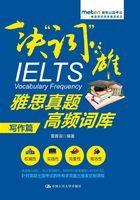
LIST 3
innate [ɪ’neɪt] ★★★★★
adj. 天生的
➢ Young children innate abilities should be harnessed to make these benefits more achievable. (C9T1) 年纪小的孩子的先天能力应该好好开发,使这些优势更容易实现。
at an early age ★★★★★
从小
➢ It is important for children to learn the difference between right and wrong at an early age. (C10T1) 孩子们从小就能分辨对错是很重要的。
distinction [dɪ’stɪŋkʃn] ★★★★★
n. 区别
➢ Punishment is necessary to help them learn this distinction. (C10T1)为了帮助他们了解这种区别,惩罚是必要的。
n. 种类
➢ What sort of punishment should parents and teachers be allowed to use to teach good behaviour to children? (C10T1) 哪种惩罚方式可以让父母和老师用来教导孩子们良好的行为?
growth [ɡrəʊθ] ★★★★★
n. 成长
➢ One important stage in a child’s grow th is certainly the development of a conscience, which is linked to the ability to tell right from wrong. (C10T1) 儿童成长的一个重要阶段当然是良知的培养,而这与辨别是非的能力有关。
parenting [‘peərəntɪŋ] ★★★★★
n. 家庭教育;父母对子女的养育
➢ This skill comes with time and good parenting, and my firm conviction is that punishment does not have much of a role to play in this. (C10T1) 这种技巧的形成需要时间的积累和良好的家庭教育,而我坚信,惩罚在这个过程中并没有起多大的作用。
entirely [ɪn’taɪəli] ★★★★★
adv. 完全地
➢ I have to disagree almost entirely with the given statement. (C10T1)我完全不赞同这个给出的陈述。
depend on ★★★★★
取决于
➢ To some extent the question depends on the age of the child. (C10T1)在某种程度上,这个问题取决于孩子的年龄。
n. 婴儿;幼儿
➢ To punish a very young child is both wrong and foolish, as an infant will not understand what is happening or why he or she is being punished. (C10T1) 惩罚一个非常年幼的孩子是错误的和愚蠢的,因为婴儿不会理解正在发生的事情,也不知道为什么他或她会受到惩罚。
reward [rɪ’wɔːd] ★★★★★
v. 奖励
➢ A child can be rewarded for good behaviour. (C10T1) 孩子由于良好的行为而能得到奖励。
harsh [hɑːʃ] ★★★★
adj. 严厉的
➢ This kind but firm approach will achieve more than harsh punishments, which might entail many negative consequences unintended by the parents. (C10T1) 比起严厉的惩罚可能带来家长意想不到的负面效果来说,这种温和坚定的做法可能更好。
goodrole modelling ★★★★
行为榜样
➢ To help a child learn the difference between right and wrong, teachers and parents should firstly provide good role modelling in their own behavior. (C10T1) 为了帮助孩子分辨对错,老师和家长应该首先以身作则。
sanction [‘sæŋkʃn] ★★★
n. 处罚
➢ If sanctions are needed, the punishment should not be of a physical nature. 如果需要处罚,也不应该选择体罚。
accep table [ək’septəbl] ★★★★★
adj. 可以接受的
➢ It is acceptable for larger people to hit smaller ones—an outcome which may well result in the child starting to bully others. (C10T1)大的人可以欺凌更小的人是可以接受的——这一结果很可能会导致孩子开始欺负别人。
cruel [‘kruːəl] ★★★★
adj. 残酷的
➢ Nor should the punishment be in any way cruel. (C10T1) 惩罚也不应该是残忍的。
apologize [ə’pɒlədʒaɪz] ★★★★
v. 道歉
➢ Children are made to pick up rubbish they have dropped, clean up graffiti they have drawn, or apologize to som eone they have hurt. (C10T1) 孩子们被要求捡起他们扔的垃圾,清理他们画的涂鸦,或者向他们伤害过的人道歉。
punishment [‘pʌnɪʃmənt] ★★★★
n. 惩罚
➢ In these ways responsibility is developed in the child, which leads to much better future behaviour than does punishment. (C10T1) 用这些方法帮助孩子们培养责任感,比起用惩罚引导孩子们今后的行为更有效果。
v. 培养
➢ It is important for students to cultivate independence and self-control.对于学生来说,培养独立性和自控能力很重要。
accumulate [ə’kju:m juleIt] ★★★★★
v. 积累
➢ Gap years may offer students an opportunity to accumulate work experience and cultivate independence. 学业间隙年可能提供给学生积累工作经验和培养独立性的机会。
schooling [‘sku:lIŋ] ★★★★★
n.学校教育
➢ College graduates are paid much more than those without a decent schooling. 大学毕业生比那些没有受过良好教育的人获得更多的薪资。
upbringing [ˈʌpbrɪŋɪŋ] ★★★★
n. 家庭教育
➢ Upbringing is essential to the grow th of children. 家庭教育对于孩子的成长来说是十分重要的。
youngster [‘jʌŋstə] ★★★★★
n. 青少年
➢ Youngsters should be encouraged to take part in various outdoor activities. 应该鼓励青少年参与各类户外活动。
peer pressure ★★★★
来自其他同学的压力
➢ Students tend to suffer from peer pressure when they study at school.学生在学校会承受来自其他同学的压力。
team spirit ★★★★
团队精神
➢ Team spirit is essential in modern society. 团队精神在当代社会是非常重要的。
studen ts’ feedback ★★★★
学生的反馈
➢ Students’ feedback can help teachers to improve their teaching methods. 学生的反馈有助于教师改进教学方法。
extra-cu rricular activity ★★★★★
课外活动
➢ Engaging in extra-curricular activities is beneficial for students’development. 参与课外活动对学生发展有益。
misbehavior [‘m IsbI’heIvjə] ★★★★
n.不规矩行为,不正当举止
➢ Students should obey school rules and any misbehavior should be punished. 学生应该遵守学校规则,而且犯错应该受到惩罚。
academic [9ækə’dem Ik] ★★★★★
adj.学术的
➢ Many students choose to further their study abroad to experience different academic environments. 许多学生选择出国留学来体验不同的学术环境。
学习成绩
➢ Being addicted to electronic games tends to affect student’s academic performance. 沉迷于电子游戏往往会影响学生的学习成绩。
in terpersonal [Intə’pə:sənl] ★★★★★
adj.人际的,人际交往的
➢ The school is not an ideal place to learn about interpersonal skills. 学校并不是一个学习人际交往技能的理想场所。
p ractical [‘præktIkəl] ★★★★★
adj.实践的,实用的
➢ Apart from academic knowledge, graduates also need to be equipped with practical skills. 除了学术知识外,毕业生还需要具备实践技能。
tuition fee ★★★★
学费
➢ Some people think college students should pay tuition fees themselves.
一些人觉得大学生应该自己付学费。
curricu lum [kə’rIkjuləm] ★★★
n. 课程
➢ Many people wonder if international news should be a part of the curriculum of secondary schools. 许多人不知道国际新闻是否应该成为中学课程之一。
job-orien ted [dʒɔb‘ɔ:riəntId] ★★★★★
adj. 跟工作相关的
➢ Nowadays, Chinese young people are not as job-oriented as parents and grandparents. 如今,中国的年轻一代已不像他们的父辈和祖辈那样以工作为重心。
adjust [ə’dʒʌst] ★★★★★
v.调整
➢ Teachers should adjust their teaching method in order to meet the students’ needs. 教师应该按照学生的要求调整教学方式。
overseas [‘əuvə’si:z] ★★★★★
adj. 海外的
➢ Some students take part in overseas study with the aim of acquiring advanced knowledge and technology in foreign countries. 一些学生去海外学习的目的是学习国外先进的知识和技术。
psycho logical soundness ★★★
心理健康
➢ Teachers and parents should take effective measures to ensure children’s psycho logical soundness in add ition to academ ic performance. 在课业之余,老师和家长应该采取有效措施来确保学生的心理健康。
home environment ★★★★★
家庭环境
➢ It is critical for parents to create a secure and loving home environment for children. 家长为孩子们创造一个安全温馨的家庭环境很重要。
传授知识
➢ Some people think the main function of any university is to impart academic knowledge. 一些人认为任何一所大学的主要作用都是传授学术知识。